The 22nd Annual Grammy Awards were held on February 27, 1980, at Shrine Auditorium, Los Angeles, and were broadcast live on American television. They recognized accomplishments by musicians from the year 1979. This year was notable for being the first year to have a designated category for Rock music.
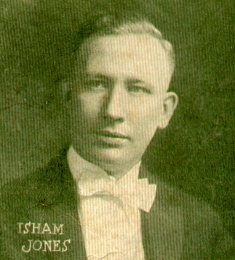
Isham Edgar Jones was an American bandleader, saxophonist, bassist and songwriter.
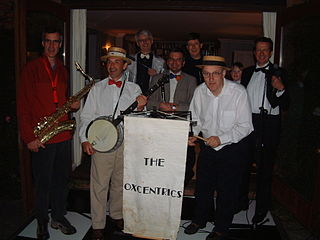
The Oxcentrics is a Dixieland jazz band founded in 1975 at Oxford University. The band's name was derived from The Oxontrics, an original 1920s jazz band. Several members were from University College, where many of the rehearsals took place. They played at a number of Oxford Balls, for the Oxford University Jazz Club, on May Morning, and for other events, including playing on punts on the River Cherwell in Oxford. The line-up, mostly Oxford University undergraduates, who recorded The Halcyon Days of the '20s & '30s on 29 February 1976 at the Acorn Studios in Stonesfield, Oxfordshire, and the songs recorded were:

Dorothy Michelle Provine was an American singer, dancer and actress. Born in 1935 in Deadwood, South Dakota, she grew up in Seattle, Washington, and was hired in 1958 by Warner Bros., after which she first starred in The Bonnie Parker Story and played many roles in TV series. During the 1960s, Provine starred in series such as The Alaskans and The Roaring Twenties, and her major film roles included It's a Mad, Mad, Mad, Mad World (1963), Good Neighbor Sam (1964), The Great Race (1965). That Darn Cat! (1965), Kiss the Girls and Make Them Die (1966), Who's Minding the Mint? (1967), and Never a Dull Moment (1968). In 1968, Provine married the film and television director Robert Day and mostly retired. She died of emphysema on April 25, 2010, in Bremerton, Washington.

"It Had to Be You" is a popular song composed by Isham Jones, with lyrics by Gus Kahn. It was published on May 9, 1924. by Jerome H. Remick & Co. of New York. The Isham Jones Orchestra recorded an instrumental version of it on April 24, 1924, at Brunswick Studios, 799 Seventh Avenue, New York City, and it was released in July.
"Charmaine" is a popular song written by Ernö Rapée and Lew Pollack. The song was written in 1926 and published in 1927. However, Desmond Carrington on his BBC Radio 2 programme marked the song's writing as being in 1913.

The Roaring 20s is an American drama television series starring Rex Reason, Donald May and Dorothy Provine that was broadcast by the American Broadcasting Company (ABC) from October 15, 1960, until January 20, 1962.
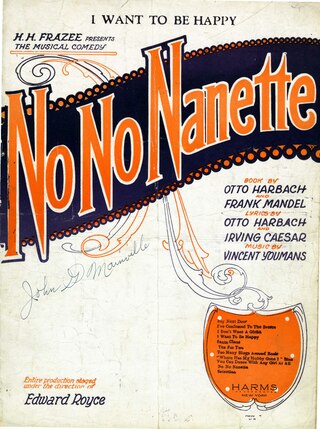
"I Want to Be Happy" is a song with music by Vincent Youmans and lyrics by Irving Caesar written for the 1925 musical No, No, Nanette.
"It All Depends on You" is a 1926 popular song with music by Ray Henderson and lyrics by Buddy G. DeSylva and Lew Brown. The song, written for the musical Big Boy, was published in 1926. It was featured in the hit 1928 Warner Bros. film The Singing Fool, starring Al Jolson, Betty Bronson and Josephine Dunn, and directed by Lloyd Bacon.
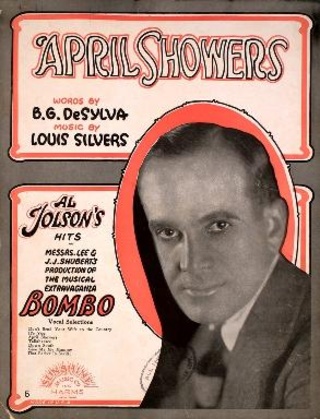
"April Showers" is a 1921 popular song composed by Louis Silvers with lyrics by B. G. De Sylva.
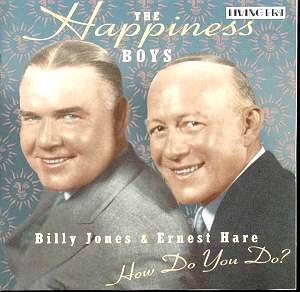
The Happiness Boys was a popular radio program of the early 1920s. It featured the vocal duo of tenor Billy Jones (1889-1940) and bass/baritone Ernie Hare (1883-1939), who sang novelty songs.
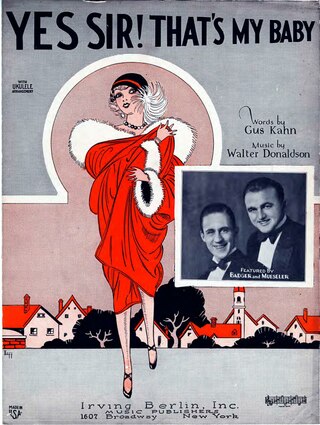
"Yes Sir, That's My Baby" is a popular U.S. song from 1925. The music was written by Walter Donaldson and the lyrics by Gus Kahn. It is now in the public domain.
"Orange Blossom Special" is a fiddle tune about the luxury passenger train of the same name. The song was written by Ervin T. Rouse (1917–1981) in 1938 and was first recorded by Rouse and his brother Gordon in 1939. Often called simply "The Special" or "OBS", the song is commonly referred to as "the fiddle player's national anthem".
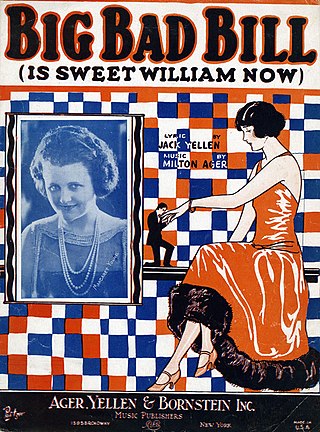
"Big Bad Bill (Is Sweet William Now)" is a song with music by Milton Ager and lyrics by Jack Yellen, written in 1924. The song became a vocal hit for Margaret Young accompanied by Rube Bloom, and an instrumental hit for the Don Clark Orchestra.

Simon Wallace is a British composer and pianist.

"Flamin' Mamie" is a 1925 jazz classic composed by Paul Whiteman and Fred Rose.
"I'll Close My Eyes", first published in 1945, is a song written and composed by the English songwriter and bandleader Billy Reid. This song is usually performed with altered lyrics by the American songwriter Buddy Kaye. The song has become a jazz standard.

Toot, Toot, Tootsie is a 1922 song with music and lyrics by Gus Kahn, Ernie Erdman and Danny Russo, per the credits on the original sheet music cover. Some other sources also credit Ted Fio Rito and Robert King for the song, but make no mention of Dan Russo. It debuted in the Broadway musical Bombo, where it was a major hit. It was first recorded by Al Jolson with Frank Crumit's orchestra for Columbia Records on September 9, 1922. It was further popularised by the racy singer-comedian Eddie Cantor.

Nathan Glantz was an early 20th-century American jazz bandleader.














